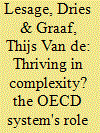| Srl | Item |
| 1 |
ID:
099207


|
|
|
|
|
| Publication |
2010.
|
| Summary/Abstract |
In recent years, the G8+5 system has proven to be a major focal point of international cooperation in the field of energy efficiency. The G8 has set up multiple dialogues and collaborative frameworks with five emerging economies (China, India, Brazil, Mexico and South Africa) on energy and energy efficiency. The most prominent initiative so far is the creation of the International Partnership for Energy Efficiency Cooperation (IPEEC) in 2009. This article critically evaluates these joint efforts between the G8 and the 'Plus Five' on energy efficiency. More specifically, the purpose of this article is (1) to frame and explain the emergence of this kind of great-power cooperation; (2) to map G8+5 collaboration on energy efficiency; and (3) to provide a critical assessment of the relevance, impact and results of G8+5 initiated energy efficiency initiatives. The main conclusion is that the G8+5 system has performed better on the external dimension (steering global governance) than on the internal dimension (coordination of domestic policies) of global energy efficiency governance.
|
|
|
|
|
|
|
|
|
|
|
|
|
|
|
|
| 2 |
ID:
117944


|
|
|
|
|
| Publication |
2013.
|
| Summary/Abstract |
The purpose of this article is to reveal how two organizations from the OECD system-the Organisation for Economic Co-operation and Development and the International Energy Agency-are maneuvering strategically to retain their focal places in the regime complexes that developed around taxation and energy, respectively. It argues that their bid for leadership and centralization is built on the comparative advantages they enjoy as institutions; namely, their historically accumulated expertise and distinct working methods, their close ties with the Group of 8, and their rapidly developing relationships with emerging powers. Notwithstanding these institutional assets, a revision of the OECD's membership could further cement and legitimize the central role of the OECD system in these regime complexes.
|
|
|
|
|
|
|
|
|
|
|
|
|
|
|
|